
At 1.15am on the unofficial sixth day of the international meeting of the Group of Governmental experts (GGE) on Lethal Autonomous Weapons (LAWS), the Chair’s August report was approved after grueling negotiations. The week of discussions concluded with only one recommendation: to continue the current mandate of exploring ‘options for an outcome.’ That desired outcome is yet to be decided.
During the week of 27 August, 88 states met to discuss the implications of LAWS, colloquially known as ‘killer robots’, with a specific focus on the retention of human control over the use of force. Civil society groups hosted side events throughout the week covering issues such as the role of tech companies and the gendered implications of killer robots.
Discussions were held in the Human Rights and Alliance of Civilisations Room, generally home to the Human Rights Council. Advocates of the ban hoped the room may encourage discussions to incorporate human rights. On day 5, the Director of Reaching Critical Will reported that the US and Russia both objected to texts stating international human rights law should guide continued work.
To the disappointment of civil society and a majority of states, calls to pursue future action to address LAWS through diplomatic negotiations on a new treaty were blocked by states with advanced militaries. Five states - Australia, Israel, Russia, South Korea, and USA - made clear that they “strongly opposed any work aimed at a new treaty, political declaration, or any other new measures.” The meetings were held under the auspices of the Convention on Certain Conventional Weapons (CCW) which operates on a consensus decision-making basis meaning any state or group of states can block progress. States will have to make a decision on the way forward at the annual CCW meeting in November.
The UK in Geneva
The UK Government's working paper for the GGE reiterated Britain’s position that existing international law is sufficient to govern the “design, delivery, operation, regulation and disposal of weapons systems,” but indicated a welcome degree of willingness to engage regarding the delivery and assurance of human control. In discussions, the working paper was referenced as a starting point on the issue of human control. Following the previous GGE meetings in April, the UK responded to our joint letter by rejecting calls for a ban of killer robots - a position in line with a handful of other states with large militaries but inconsistent with the majority of CCW states who believe a ban is necessary. The UK did not explicitly reiterate the same level of opposition at the GGE meeting, commenting in the discussion of recommendations that it simply “supports the mandate as it is and it not prepared to move to a negotiating mandate.”
UNA-UK remains disappointed by the UK Government’s unwillingness to cooperate productively with international partners on a binding instrument to prohibit LAWS.
A more in-depth analysis of the UK’s position regarding LAWS can be found in our most recent report: Killer Robots: Who is making the decision?
Act now
We are asking all our members, supporters and local UNAs to contact their MPs to urge them to call on the government to cooperate with the international community and join the growing number of states supporting a ban on killer robots.
We’ve launched a killer robots campaign hub with all the necessary tools to help you campaign on this vital issue.
As an active member of the Campaign to Stop Killer Robots, UNA-UK will continue to campaign for the UK to support a prohibition.
Read the Future of Life pledge and find the full list of signatories here.
And read our briefing here.
Photograph: Chair of Governmental Group of Experts on Lethal Autonomous Weapons Systems Briefs Press, Credit: UN Photo






